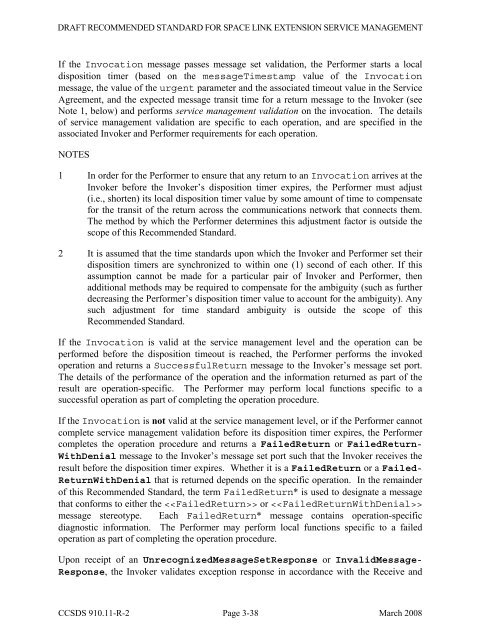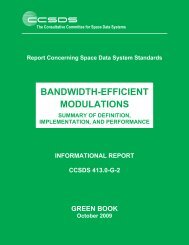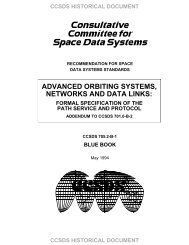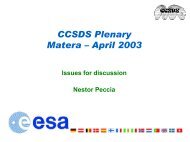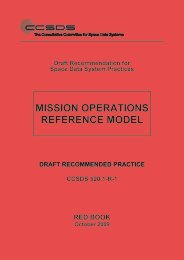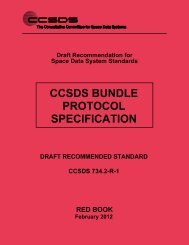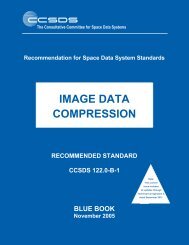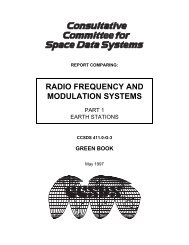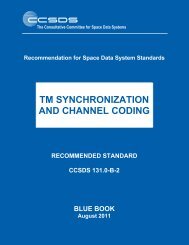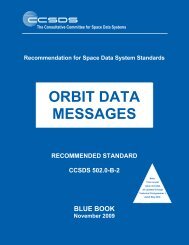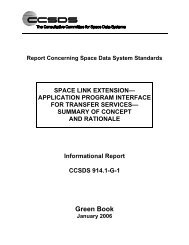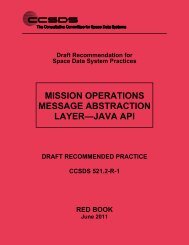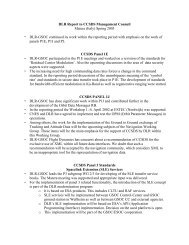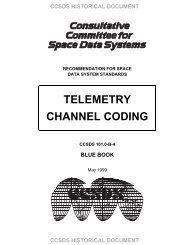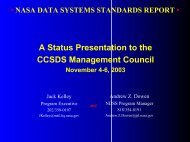- Page 2 and 3:
Draft Recommendation for Space Data
- Page 4 and 5:
DRAFT RECOMMENDED STANDARD FOR SPAC
- Page 6 and 7:
DRAFT RECOMMENDED STANDARD FOR SPAC
- Page 8 and 9:
DRAFT RECOMMENDED STANDARD FOR SPAC
- Page 10 and 11:
DRAFT RECOMMENDED STANDARD FOR SPAC
- Page 12 and 13:
DRAFT RECOMMENDED STANDARD FOR SPAC
- Page 14 and 15:
DRAFT RECOMMENDED STANDARD FOR SPAC
- Page 16 and 17:
DRAFT RECOMMENDED STANDARD FOR SPAC
- Page 18 and 19:
DRAFT RECOMMENDED STANDARD FOR SPAC
- Page 20 and 21:
DRAFT RECOMMENDED STANDARD FOR SPAC
- Page 22 and 23:
DRAFT RECOMMENDED STANDARD FOR SPAC
- Page 24 and 25:
DRAFT RECOMMENDED STANDARD FOR SPAC
- Page 26 and 27:
DRAFT RECOMMENDED STANDARD FOR SPAC
- Page 28 and 29:
DRAFT RECOMMENDED STANDARD FOR SPAC
- Page 30 and 31:
DRAFT RECOMMENDED STANDARD FOR SPAC
- Page 32 and 33:
DRAFT RECOMMENDED STANDARD FOR SPAC
- Page 34 and 35:
DRAFT RECOMMENDED STANDARD FOR SPAC
- Page 36 and 37:
DRAFT RECOMMENDED STANDARD FOR SPAC
- Page 38 and 39:
DRAFT RECOMMENDED STANDARD FOR SPAC
- Page 40 and 41:
DRAFT RECOMMENDED STANDARD FOR SPAC
- Page 42 and 43:
DRAFT RECOMMENDED STANDARD FOR SPAC
- Page 44 and 45:
DRAFT RECOMMENDED STANDARD FOR SPAC
- Page 46 and 47: DRAFT RECOMMENDED STANDARD FOR SPAC
- Page 48 and 49: CCSDS 910.11-R-2 Page 2-5 March 200
- Page 50 and 51: DRAFT RECOMMENDED STANDARD FOR SPAC
- Page 52 and 53: DRAFT RECOMMENDED STANDARD FOR SPAC
- Page 54 and 55: DRAFT RECOMMENDED STANDARD FOR SPAC
- Page 56 and 57: DRAFT RECOMMENDED STANDARD FOR SPAC
- Page 58 and 59: DRAFT RECOMMENDED STANDARD FOR SPAC
- Page 60 and 61: DRAFT RECOMMENDED STANDARD FOR SPAC
- Page 62 and 63: DRAFT RECOMMENDED STANDARD FOR SPAC
- Page 64 and 65: DRAFT RECOMMENDED STANDARD FOR SPAC
- Page 66 and 67: DRAFT RECOMMENDED STANDARD FOR SPAC
- Page 68 and 69: DRAFT RECOMMENDED STANDARD FOR SPAC
- Page 70 and 71: CCSDS 910.11-R-2 Page 3-11 March 20
- Page 72 and 73: CCSDS 910.11-R-2 Page 3-13 March 20
- Page 74 and 75: DRAFT RECOMMENDED STANDARD FOR SPAC
- Page 76 and 77: DRAFT RECOMMENDED STANDARD FOR SPAC
- Page 78 and 79: DRAFT RECOMMENDED STANDARD FOR SPAC
- Page 80 and 81: DRAFT RECOMMENDED STANDARD FOR SPAC
- Page 82 and 83: DRAFT RECOMMENDED STANDARD FOR SPAC
- Page 84 and 85: DRAFT RECOMMENDED STANDARD FOR SPAC
- Page 86 and 87: DRAFT RECOMMENDED STANDARD FOR SPAC
- Page 88 and 89: DRAFT RECOMMENDED STANDARD FOR SPAC
- Page 90 and 91: DRAFT RECOMMENDED STANDARD FOR SPAC
- Page 92 and 93: DRAFT RECOMMENDED STANDARD FOR SPAC
- Page 94 and 95: DRAFT RECOMMENDED STANDARD FOR SPAC
- Page 98 and 99: DRAFT RECOMMENDED STANDARD FOR SPAC
- Page 100 and 101: DRAFT RECOMMENDED STANDARD FOR SPAC
- Page 102 and 103: DRAFT RECOMMENDED STANDARD FOR SPAC
- Page 104 and 105: DRAFT RECOMMENDED STANDARD FOR SPAC
- Page 106 and 107: DRAFT RECOMMENDED STANDARD FOR SPAC
- Page 108 and 109: DRAFT RECOMMENDED STANDARD FOR SPAC
- Page 110 and 111: DRAFT RECOMMENDED STANDARD FOR SPAC
- Page 112 and 113: DRAFT RECOMMENDED STANDARD FOR SPAC
- Page 114 and 115: DRAFT RECOMMENDED STANDARD FOR SPAC
- Page 116 and 117: DRAFT RECOMMENDED STANDARD FOR SPAC
- Page 118 and 119: DRAFT RECOMMENDED STANDARD FOR SPAC
- Page 120 and 121: DRAFT RECOMMENDED STANDARD FOR SPAC
- Page 122 and 123: DRAFT RECOMMENDED STANDARD FOR SPAC
- Page 124 and 125: DRAFT RECOMMENDED STANDARD FOR SPAC
- Page 126 and 127: DRAFT RECOMMENDED STANDARD FOR SPAC
- Page 128 and 129: DRAFT RECOMMENDED STANDARD FOR SPAC
- Page 130 and 131: DRAFT RECOMMENDED STANDARD FOR SPAC
- Page 132 and 133: DRAFT RECOMMENDED STANDARD FOR SPAC
- Page 134 and 135: DRAFT RECOMMENDED STANDARD FOR SPAC
- Page 136 and 137: DRAFT RECOMMENDED STANDARD FOR SPAC
- Page 138 and 139: DRAFT RECOMMENDED STANDARD FOR SPAC
- Page 140 and 141: DRAFT RECOMMENDED STANDARD FOR SPAC
- Page 142 and 143: DRAFT RECOMMENDED STANDARD FOR SPAC
- Page 144 and 145: DRAFT RECOMMENDED STANDARD FOR SPAC
- Page 146 and 147:
DRAFT RECOMMENDED STANDARD FOR SPAC
- Page 148 and 149:
DRAFT RECOMMENDED STANDARD FOR SPAC
- Page 150 and 151:
DRAFT RECOMMENDED STANDARD FOR SPAC
- Page 152 and 153:
DRAFT RECOMMENDED STANDARD FOR SPAC
- Page 154 and 155:
DRAFT RECOMMENDED STANDARD FOR SPAC
- Page 156 and 157:
DRAFT RECOMMENDED STANDARD FOR SPAC
- Page 158 and 159:
DRAFT RECOMMENDED STANDARD FOR SPAC
- Page 160 and 161:
DRAFT RECOMMENDED STANDARD FOR SPAC
- Page 162 and 163:
DRAFT RECOMMENDED STANDARD FOR SPAC
- Page 164 and 165:
DRAFT RECOMMENDED STANDARD FOR SPAC
- Page 166 and 167:
DRAFT RECOMMENDED STANDARD FOR SPAC
- Page 168 and 169:
DRAFT RECOMMENDED STANDARD FOR SPAC
- Page 170 and 171:
DRAFT RECOMMENDED STANDARD FOR SPAC
- Page 172 and 173:
DRAFT RECOMMENDED STANDARD FOR SPAC
- Page 174 and 175:
DRAFT RECOMMENDED STANDARD FOR SPAC
- Page 176 and 177:
DRAFT RECOMMENDED STANDARD FOR SPAC
- Page 178 and 179:
DRAFT RECOMMENDED STANDARD FOR SPAC
- Page 180 and 181:
DRAFT RECOMMENDED STANDARD FOR SPAC
- Page 182 and 183:
DRAFT RECOMMENDED STANDARD FOR SPAC
- Page 184 and 185:
DRAFT RECOMMENDED STANDARD FOR SPAC
- Page 186 and 187:
DRAFT RECOMMENDED STANDARD FOR SPAC
- Page 188 and 189:
DRAFT RECOMMENDED STANDARD FOR SPAC
- Page 190 and 191:
DRAFT RECOMMENDED STANDARD FOR SPAC
- Page 192 and 193:
DRAFT RECOMMENDED STANDARD FOR SPAC
- Page 194 and 195:
DRAFT RECOMMENDED STANDARD FOR SPAC
- Page 196 and 197:
DRAFT RECOMMENDED STANDARD FOR SPAC
- Page 198 and 199:
DRAFT RECOMMENDED STANDARD FOR SPAC
- Page 200 and 201:
DRAFT RECOMMENDED STANDARD FOR SPAC
- Page 202 and 203:
DRAFT RECOMMENDED STANDARD FOR SPAC
- Page 204 and 205:
DRAFT RECOMMENDED STANDARD FOR SPAC
- Page 206 and 207:
DRAFT RECOMMENDED STANDARD FOR SPAC
- Page 208 and 209:
DRAFT RECOMMENDED STANDARD FOR SPAC
- Page 210 and 211:
DRAFT RECOMMENDED STANDARD FOR SPAC
- Page 212 and 213:
DRAFT RECOMMENDED STANDARD FOR SPAC
- Page 214 and 215:
DRAFT RECOMMENDED STANDARD FOR SPAC
- Page 216 and 217:
DRAFT RECOMMENDED STANDARD FOR SPAC
- Page 218 and 219:
DRAFT RECOMMENDED STANDARD FOR SPAC
- Page 220 and 221:
DRAFT RECOMMENDED STANDARD FOR SPAC
- Page 222 and 223:
DRAFT RECOMMENDED STANDARD FOR SPAC
- Page 224 and 225:
DRAFT RECOMMENDED STANDARD FOR SPAC
- Page 226 and 227:
DRAFT RECOMMENDED STANDARD FOR SPAC
- Page 228 and 229:
DRAFT RECOMMENDED STANDARD FOR SPAC
- Page 230 and 231:
DRAFT RECOMMENDED STANDARD FOR SPAC
- Page 232 and 233:
DRAFT RECOMMENDED STANDARD FOR SPAC
- Page 234 and 235:
DRAFT RECOMMENDED STANDARD FOR SPAC
- Page 236 and 237:
DRAFT RECOMMENDED STANDARD FOR SPAC
- Page 238 and 239:
DRAFT RECOMMENDED STANDARD FOR SPAC
- Page 240 and 241:
DRAFT RECOMMENDED STANDARD FOR SPAC
- Page 242 and 243:
DRAFT RECOMMENDED STANDARD FOR SPAC
- Page 244 and 245:
DRAFT RECOMMENDED STANDARD FOR SPAC
- Page 246 and 247:
DRAFT RECOMMENDED STANDARD FOR SPAC
- Page 248 and 249:
DRAFT RECOMMENDED STANDARD FOR SPAC
- Page 250 and 251:
DRAFT RECOMMENDED STANDARD FOR SPAC
- Page 252 and 253:
DRAFT RECOMMENDED STANDARD FOR SPAC
- Page 254 and 255:
DRAFT RECOMMENDED STANDARD FOR SPAC
- Page 256 and 257:
DRAFT RECOMMENDED STANDARD FOR SPAC
- Page 258 and 259:
DRAFT RECOMMENDED STANDARD FOR SPAC
- Page 260 and 261:
DRAFT RECOMMENDED STANDARD FOR SPAC
- Page 262 and 263:
DRAFT RECOMMENDED STANDARD FOR SPAC
- Page 264 and 265:
DRAFT RECOMMENDED STANDARD FOR SPAC
- Page 266 and 267:
DRAFT RECOMMENDED STANDARD FOR SPAC
- Page 268 and 269:
DRAFT RECOMMENDED STANDARD FOR SPAC
- Page 270 and 271:
DRAFT RECOMMENDED STANDARD FOR SPAC
- Page 272 and 273:
DRAFT RECOMMENDED STANDARD FOR SPAC
- Page 274 and 275:
DRAFT RECOMMENDED STANDARD FOR SPAC
- Page 276 and 277:
DRAFT RECOMMENDED STANDARD FOR SPAC
- Page 278 and 279:
DRAFT RECOMMENDED STANDARD FOR SPAC
- Page 280 and 281:
DRAFT RECOMMENDED STANDARD FOR SPAC
- Page 282 and 283:
DRAFT RECOMMENDED STANDARD FOR SPAC
- Page 284 and 285:
DRAFT RECOMMENDED STANDARD FOR SPAC
- Page 286 and 287:
DRAFT RECOMMENDED STANDARD FOR SPAC
- Page 288 and 289:
DRAFT RECOMMENDED STANDARD FOR SPAC
- Page 290 and 291:
DRAFT RECOMMENDED STANDARD FOR SPAC
- Page 292 and 293:
DRAFT RECOMMENDED STANDARD FOR SPAC
- Page 294 and 295:
DRAFT RECOMMENDED STANDARD FOR SPAC
- Page 296 and 297:
DRAFT RECOMMENDED STANDARD FOR SPAC
- Page 298 and 299:
DRAFT RECOMMENDED STANDARD FOR SPAC
- Page 300 and 301:
DRAFT RECOMMENDED STANDARD FOR SPAC
- Page 302 and 303:
DRAFT RECOMMENDED STANDARD FOR SPAC
- Page 304 and 305:
DRAFT RECOMMENDED STANDARD FOR SPAC
- Page 306 and 307:
DRAFT RECOMMENDED STANDARD FOR SPAC
- Page 308 and 309:
DRAFT RECOMMENDED STANDARD FOR SPAC
- Page 310 and 311:
DRAFT RECOMMENDED STANDARD FOR SPAC
- Page 312 and 313:
DRAFT RECOMMENDED STANDARD FOR SPAC
- Page 314 and 315:
DRAFT RECOMMENDED STANDARD FOR SPAC
- Page 316 and 317:
DRAFT RECOMMENDED STANDARD FOR SPAC
- Page 318 and 319:
DRAFT RECOMMENDED STANDARD FOR SPAC
- Page 320 and 321:
DRAFT RECOMMENDED STANDARD FOR SPAC
- Page 322 and 323:
DRAFT RECOMMENDED STANDARD FOR SPAC
- Page 324 and 325:
DRAFT RECOMMENDED STANDARD FOR SPAC
- Page 326 and 327:
DRAFT RECOMMENDED STANDARD FOR SPAC
- Page 328 and 329:
DRAFT RECOMMENDED STANDARD FOR SPAC
- Page 330 and 331:
DRAFT RECOMMENDED STANDARD FOR SPAC
- Page 332 and 333:
DRAFT RECOMMENDED STANDARD FOR SPAC
- Page 334 and 335:
DRAFT RECOMMENDED STANDARD FOR SPAC
- Page 336 and 337:
DRAFT RECOMMENDED STANDARD FOR SPAC
- Page 338 and 339:
DRAFT RECOMMENDED STANDARD FOR SPAC
- Page 340 and 341:
DRAFT RECOMMENDED STANDARD FOR SPAC
- Page 342 and 343:
DRAFT RECOMMENDED STANDARD FOR SPAC
- Page 344 and 345:
DRAFT RECOMMENDED STANDARD FOR SPAC
- Page 346 and 347:
DRAFT RECOMMENDED STANDARD FOR SPAC
- Page 348 and 349:
DRAFT RECOMMENDED STANDARD FOR SPAC
- Page 350 and 351:
DRAFT RECOMMENDED STANDARD FOR SPAC
- Page 352 and 353:
DRAFT RECOMMENDED STANDARD FOR SPAC
- Page 354 and 355:
DRAFT RECOMMENDED STANDARD FOR SPAC
- Page 356 and 357:
DRAFT RECOMMENDED STANDARD FOR SPAC
- Page 358 and 359:
DRAFT RECOMMENDED STANDARD FOR SPAC
- Page 360 and 361:
DRAFT RECOMMENDED STANDARD FOR SPAC
- Page 362 and 363:
DRAFT RECOMMENDED STANDARD FOR SPAC
- Page 364 and 365:
DRAFT RECOMMENDED STANDARD FOR SPAC
- Page 366 and 367:
DRAFT RECOMMENDED STANDARD FOR SPAC
- Page 368 and 369:
DRAFT RECOMMENDED STANDARD FOR SPAC
- Page 370 and 371:
DRAFT RECOMMENDED STANDARD FOR SPAC
- Page 372 and 373:
DRAFT RECOMMENDED STANDARD FOR SPAC
- Page 374 and 375:
DRAFT RECOMMENDED STANDARD FOR SPAC
- Page 376 and 377:
DRAFT RECOMMENDED STANDARD FOR SPAC
- Page 378 and 379:
DRAFT RECOMMENDED STANDARD FOR SPAC
- Page 380 and 381:
DRAFT RECOMMENDED STANDARD FOR SPAC
- Page 382 and 383:
DRAFT RECOMMENDED STANDARD FOR SPAC
- Page 384 and 385:
DRAFT RECOMMENDED STANDARD FOR SPAC
- Page 386 and 387:
DRAFT RECOMMENDED STANDARD FOR SPAC
- Page 388 and 389:
DRAFT RECOMMENDED STANDARD FOR SPAC
- Page 390 and 391:
DRAFT RECOMMENDED STANDARD FOR SPAC
- Page 392 and 393:
DRAFT RECOMMENDED STANDARD FOR SPAC
- Page 394 and 395:
DRAFT RECOMMENDED STANDARD FOR SPAC
- Page 396 and 397:
DRAFT RECOMMENDED STANDARD FOR SPAC
- Page 398 and 399:
DRAFT RECOMMENDED STANDARD FOR SPAC
- Page 400 and 401:
DRAFT RECOMMENDED STANDARD FOR SPAC
- Page 402 and 403:
DRAFT RECOMMENDED STANDARD FOR SPAC
- Page 404 and 405:
DRAFT RECOMMENDED STANDARD FOR SPAC
- Page 406 and 407:
DRAFT RECOMMENDED STANDARD FOR SPAC
- Page 408 and 409:
DRAFT RECOMMENDED STANDARD FOR SPAC
- Page 410 and 411:
DRAFT RECOMMENDED STANDARD FOR SPAC
- Page 412 and 413:
DRAFT RECOMMENDED STANDARD FOR SPAC
- Page 414 and 415:
DRAFT RECOMMENDED STANDARD FOR SPAC
- Page 416 and 417:
DRAFT RECOMMENDED STANDARD FOR SPAC
- Page 418 and 419:
DRAFT RECOMMENDED STANDARD FOR SPAC
- Page 420 and 421:
DRAFT RECOMMENDED STANDARD FOR SPAC
- Page 422 and 423:
DRAFT RECOMMENDED STANDARD FOR SPAC
- Page 424 and 425:
DRAFT RECOMMENDED STANDARD FOR SPAC
- Page 426 and 427:
DRAFT RECOMMENDED STANDARD FOR SPAC
- Page 428 and 429:
DRAFT RECOMMENDED STANDARD FOR SPAC
- Page 430 and 431:
DRAFT RECOMMENDED STANDARD FOR SPAC
- Page 432 and 433:
DRAFT RECOMMENDED STANDARD FOR SPAC
- Page 434 and 435:
DRAFT RECOMMENDED STANDARD FOR SPAC
- Page 436:
DRAFT RECOMMENDED STANDARD FOR SPAC


